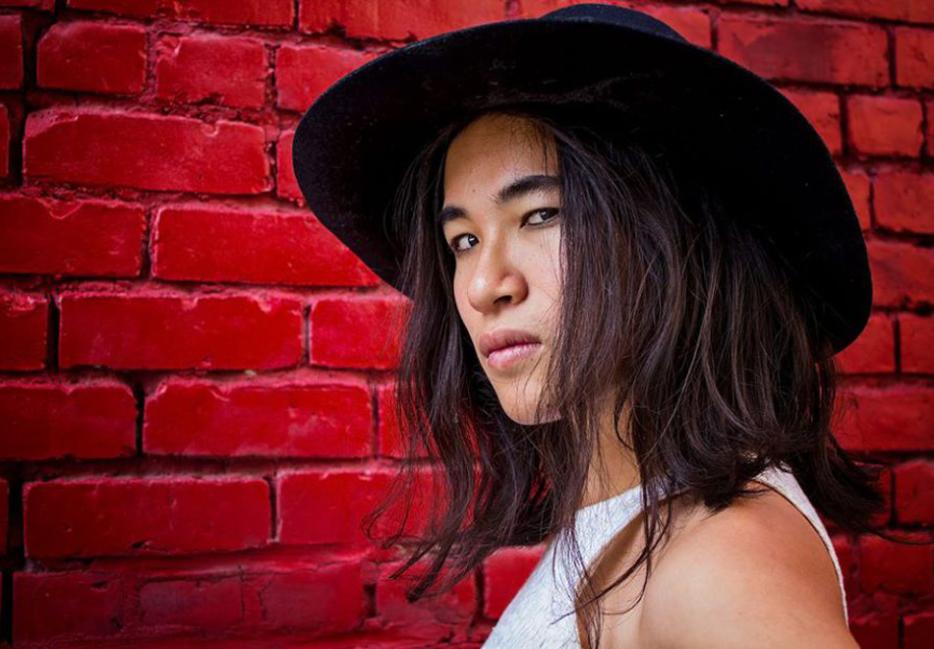The first time I met Kai Cheng Thom, we were sitting side by side on a panel at a staged dinner party eating toasted figs with honey, oven-roasted fish and sun-dried tomatoes covered in brie, as an audience watched us sip wine and dine on an elevated platform. It was performative, but oddly thrilling. The other panelists were the imitable Trish Salah, Erin Wunker, and artist Madelyne Beckles and the (predetermined) topic of a dinner party conversation were Lionel Shriver’s inflammatory comments about cultural appropriation. I felt connected to all the other panelists, but there was a particularly natural flow to the way that Kai Cheng and I engaged. I felt I had known her, though we were complete strangers.
The next time I saw Kai Cheng was almost two months later. She was walking ahead of me, and without knowing who it was, I admired her black-lacquer head of hair as she began to take strides towards the store I was about to walk into myself. Her hair was the perfect bed-head style that I coveted daily, the Kate Moss joie-de-vivre, filled with insouciance. As I entered Empire, a thrift store in Montreal’s Mile End, she turned around, looked me in straight in the eyes with surprise, and grinned. It was fated.
Over the next few days we shared a coffee in Little Italy, and had a dinner date in the very uppity chic corners of Milos, a Greek restaurant with black marbled panels on Ave Du Parc. It was Christmas Eve, and I was heading to New York in a few days, and Kai Cheng was here from Toronto, taking a much needed break. But we were both writers, gravitating towards each other as women of color often do, feeling the glow of acceptance, of sharing one’s politics inherently; the tenderness that comes with not having to code-switch. It was over those few days that I learnt of Kai Cheng’s memoir/novel Fierce Femmes and Notorious Liars (Metonymy Press). Her excitement was palpable, as was mine.
Fariha Róisín: I absolutely loved your book. Let’s get right into it. Firstly, what compelled you to write a pseudo memoir that’s filled with such punchy verve and a fiery narrative about a young transgirl?
Kai Cheng Thom: FFNL was born out of a few different drives: First, I wanted to prove to myself that I could write a longform fictional narrative that was inspired by my life, but didn’t conform to the stereotype of the “transgender memoir”—the idea that trans lives are sensational and the only thing that trans people can write about is our transition. I wanted to play with this idea, to simultaneously fulfil and defy it. To write my life, but to do so in a way that put relationships between trans people, rather than the expectations of cis people, front and centre. I also wanted to write a “trans novel” that was full of magic and was fun to read, because trans people deserve magic and fun! And so, voilà—the over-the-top story that is FFNL was born.
I really loved how the narrative was fantastical because it reminds me so much of why certain identities have a rhetoric tied to them, of bleakness, of fear. Correct me if I’m wrong, but I do find that a lot of trans narratives highlight the hardships of being trans, but with FFNL I realized that there was also this (less talked about) different, exciting and magical journey attached to the everyday realities of being trans, too. I hear this a lot with #BlackLivesMatter, and “black girl magic” or “black boy joy” which is sort a re-writing of those narratives, taking it away from the white gaze. Here it felt you were taking away the cis/hetero gaze. Was that something that you decided on purposefully, or is it something that just happened, naturally?
There was definitely something purposeful about it. Absolutely sadness and frustration are a part of being trans (but also, just a part of life in general!). I think, though, that there’s a lot of pressure on the part of mainstream society for trans people to only express emotionality through sadness, or else through a sort of noble courage associated with the “plucky minority” archetype. Casey Plett writes a lot about this in her article Rise of the Gender Novel in The Walrus. It’s easier, sometimes, for cis people to read about trans people as being pitiful and brave, or to watch that narrative in movies like The Danish Girl. FFNL is part of a wave of “new” trans literature that seeks to open up the “trans story” to other emotional realities—and in the case of my novel, also, rage. I wanted my protagonist to fully and physically embody her anger—the anger at her family, anger toward her sisters, anger that is most of all directed towards herself. It’s through this rage that she finds her power and the strength to survive, and it is by learning to release her anger that she learns how to love and be loved. It’s a story that I think is much more challenging, but also in many ways more interesting for readers of all backgrounds.
I know. It’s different as a cis person, but as a queer person of color, I really related to her rage against these forces (men; patriarchy; her family) that have put limitations on her. So many times I caught myself feeling a sense of relief that she was so angry, and that I felt safe in my anger, also. I think that we don’t talk enough about how communities that are marginalized are often forced to confront their anger in private, and how dangerous it can be for a community to shame those aspects of a person’s mourning. I also liked how the character of Kimaya sort of juxtaposed that, though. You had this very maternal, loving person contrasted against the narrator’s frustration and turbulence.
Yes! The joy of writing a large cast of diverse trans women was that I got to juxtapose a lot of different characters and explore how different ways of being trans—of being women in a violent world—might play off against one another. Kimaya is one of my favorite characters to write because she’s very complicated.
She maintains this enormous, warm maternal love for nearly all the other girls of the Street of Miracles, but she is also secretly somewhat bitter and possessive. The difference between Kimaya and the narrator, though, is that Kimaya chooses to internalize her anger and manifest love (and sometimes feel resentful about it), while the narrator chooses to externalize her anger and manifest violent resistance (while secretly feeling very alone). I love the mentorship that exists between these two characters—Kimaya is in many ways based on older trans women who helped me survive some of the most difficult years of my life.
Something that Kimaya said really resonated. Half way through the book she says to the narrator that they have a certain “privilege.” In the trans community this person is called a “fish,” i.e. someone that “passes.” On the panel that we were both on I was talking about the idea of passing in a racial context and I’ll never forget how you whispered, almost to yourself, “passing is violent.” I was wondering if you could explain that a little.
Ooh, you picked up on that moment at the panel! And on one of my favorite scenes to write! That scene, a conversation between Kimaya and the narrator, is actually a moment captured almost word for word from my own life. “Passing” in either a racial or gendered sense is a complex reality that brings up a lot of emotion. On the one hand, a “fish” trans woman can walk the streets, go to a public bathroom/swimming pool/gym, apply for jobs and housing, and do all kinds of other things with greater social ease than her less “passable” sisters. Similarly, a racialized person who can “pass” as white can sometimes access more privilege than people who are read as unambiguously racialized. And at the same time, the truth is that no one can pass 100 percent of the time—as a trans woman, I only pass until someone asks for my ID (which has my legal or “birth” gender on it). On a date, I only pass until I take my clothes off (and my partner sees my trans body). Janet Mock, renowned Black trans activist and writer, calls this “conditional privilege”—it’s conditional because it can be taken from you at any time. And I would add to this that the experience of passing is violent because it is something done to you. You don’t choose whether or not you pass at any given moment. And even when you do pass, there is a part of you that’s being erased in exchange for that conditional privilege, i.e your gender history. Your ancestry. And you are put in the position of either not being authentic about who you are in order to hold onto privilege and safety, or of being really honest and putting yourself in danger. When you pass, you belong to neither world—you are too marginal for one, yet too privileged for the other. Passing is a politic meant to divide marginalized folks and turn us against each other, and it works! That’s why it hurts so much.
Ugh, this is so real! It reminds me of a line from the book that I highlighted and underlined—“How we are all so hungry for what each other has, when the truth is none of us has anything to begin with.” That sentiment just hit me in my bones. Again, I have many privileges, but I do battle with the kind of in-house fighting that exists within marginalized groups, I struggle with the idea of “passing” in a racial context all the time, because though I personally don’t think I do, I’ve been told by some that I pass (always by people on the internet—which is saying something) especially as a Muslim woman who doesn’t veil. It’s always a bit frustrating because it distills you down to one thing, it creates an avatar of you that’s only represented by your “passing qualities,” removing you of all your complexities. Like you said, you’re erased of all the things that make you who are, everything, especially your traumas. What do you think is the way we can combat this? What’s are conversations we can have that are more dynamic and healthy, as opposed to something that is finger-pointing and vicious?
The in-house fighting you’re talking about is so very, very real. I see it all the time, and especially, as you say, on the Internet. I think that you’re already participating in contributing to a healthy dynamic by being self-reflexive and acknowledging your own privileges, which is something that I think we can all stand to be reminded of. At the same time, I also see a lot of social justice dialogue (so much of which happens online) devolving into this sort of intensely puritanical political theatre in which one has to demonstrate the most marginality in order to have the most credibility.
Black feminist and reproductive rights activist Loretta Ross calls this the “oppression Olympics.” And you know, I get it—there’s a lot of anger, and a lot of jealousy, and a lot of privilege/oppression dynamics that happen within and between marginalized communities. For example, as an East Asian trans woman, I think it’s important for me to be critical about the ways in which I mobilize anti-racism in ways that might leave out Black, Indigenous, and Brown folks. On the other hand, I don’t know that call-out culture is the answer to this: I think that we must all learn to become critical and responsible for ourselves. And I think we need to re-centre compassion and solidarity—a politic of love and indispensability, as opposed to hate and disposability—in order to heal the trauma of oppression and change systemic patterns. We will need love more than ever in these very troubling and violent political times.
I agree. It’s so difficult, and nuanced. As a person with a predominantly South Asian background, I understand how much anti-blackness exists in our communities, and I stand to be more cognizant of how I facilitate that in my own life (whether that’s by using AAVE, or speaking over black women, which I’ve shamefully done in that past) and it’s pushed me to be a better person, a more intuitive person. I also think that a lot of us—especially as we live on stolen land—have to engage more thoroughly with Indigenous issues, and no doubt, as a cis-person I’m constantly learning about trans issues, and how to be a better accomplice.
You’re right, love really is the only way. But we ALL have to learn, which is why intersectionality is such an important term (which by the way, was coined by a black woman, Kimberlé Williams Crenshaw). How does that factor into your identity as a writer, if do you identify as one? Is that something you try to instill in your writing?
I definitely have lots to learn.
I do identify as a writer...which is something I take really seriously. Media makers have a responsibility—in this “post-truth” era more than ever —to search for and portray the truth (which includes emotional truths and other forms of lived experience). Writers have to have integrity, or else what good are we? And in this way, I guess that I do try to instill intersectionality into my writing, though I don’t always conceptualize it that way (while I love intersectionality as a concept, it was introduced to me in an academic setting and I tend to mentally separate my academic and artistic work). I think a lot about what Junot Diaz says about writing marginality, which is that we can’t afford to only write about our own kind of marginality in a binary way, in the manner of “us and them.” It’s much more important to write about different kinds of marginality in conversation with one another, because this is where a deeper kind of truth lives.
And in regards to FFNL, I was determined that the book bring together a cast of trans women that, despite all being trans women, also demonstrate and struggle with a lot of diversity between each other. It’s politically important, and I also think it makes for better art!
That kind of diversity of characters also examines, and challenges, any one-dimensionality a cis-person might have of a “trans story” as you mentioned earlier.
Absolutely.
Okay, last question. The character of Soraya and her murder gutted me, the detail of the “saffron rice” had me in tears. I want to ask, how do you think as a community we can help better circulate news of the deaths of trans-women, and help cease the violence and death of trans-women across North America? I know there’s no easy answer, but though I felt so moved by the book, and how fantastical it was, I felt compelled into action, too.
You’re right, there are no easy answers here, but then, there never are. The character of Soraya and the framing of her death were among the hardest parts of the book to write, largely because they were based on very real aspects of my own life in trans feminine community: The murder of a Brown trans woman in Toronto and my sense of simultaneous connect and disconnect to her life and death. As trans women, we are always impacted by the far too frequent murders of our sisters, but it’s often a strange kind of grief that comes from seeing your own death in the loss of someone whom you never got a chance to know. Soraya’s story is my response to that emotional dilemma. I still tear up when I read that passage out loud.
As for action, well, I think the most important thing the community can do is to grieve honestly and self-reflectively for murdered trans women —with a knowledge of our own culpability—and then fight doubly hard to protect the trans women who are still living today. In the haze of grief and sensation that accompanies the reports of trans women who are killed, I think it’s easy for cis people to forget those of us who are still alive, still struggling to find any safe space. I encourage folks to reach out to the trans women they know, to put aside social justice notions of how a trans woman is “supposed” to be (trans women of colour are frequently fetishized as the “perfect victim” in social justice circles, but then viciously called out for being “problematic”) and to make real connection. Buy art made by trans women. Employ trans women for fair pay in decent conditions. Advocate for trans women’s health care and social services. The vast majority of murdered trans women are women of colour and sex workers, so against fight racism and whorephobia. This is how we can keep trans women alive.






